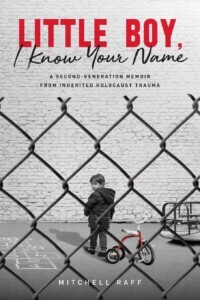Title: Little Boy, I Know Your Name: A Second-Generation Memoir From Inherited Holocaust Trauma
Author: Mitchell Raff
Publisher: River Grove Books
ISBN: 978-1-63299-764-7
Pages: 236
Genre: Memoir
Reviewed by: Jason Lulos
Pacific Book Review
 This is one of the most compelling memoirs I have read in a long time; it is heartbreaking, educational, and fascinating. Author Mitchell Raff is a great storyteller. His writing is acutely articulate and his willingness to delve into his and his family’s trauma gives this memoir a raw authenticity. As the subtitle suggests, this book explains just how systemic trauma is passed on from one generation to another. It is often unintentional, subconscious, and manifests in different ways in each subsequent generation. How is a familial trauma or a broader social ill (systemic racism or anti-Semitism) perpetuated across generations? Perhaps the best way to understand it, and it’s all too real but sometimes cloaked manifestations, is to learn of it through the lens of a profoundly personal memoir. Little Boy, I Know Your Name: A Second-Generation Memoir From Inherited Holocaust Trauma is this type of education, wrapped in a spellbinding story.
This is one of the most compelling memoirs I have read in a long time; it is heartbreaking, educational, and fascinating. Author Mitchell Raff is a great storyteller. His writing is acutely articulate and his willingness to delve into his and his family’s trauma gives this memoir a raw authenticity. As the subtitle suggests, this book explains just how systemic trauma is passed on from one generation to another. It is often unintentional, subconscious, and manifests in different ways in each subsequent generation. How is a familial trauma or a broader social ill (systemic racism or anti-Semitism) perpetuated across generations? Perhaps the best way to understand it, and it’s all too real but sometimes cloaked manifestations, is to learn of it through the lens of a profoundly personal memoir. Little Boy, I Know Your Name: A Second-Generation Memoir From Inherited Holocaust Trauma is this type of education, wrapped in a spellbinding story.
Mitchell was born into trauma. His father, mother, aunt, and uncle were all Holocaust survivors. His father was broken. His mother was full of rage. His aunt and uncle were saint-like by comparison. But what they all shared was a quiet suppression of the trauma they endured. While his father was no more than a shadowy figure in his life, his mother was all too present. First abandoning him to an orphanage and then reclaiming him at age four, she subjected him to years of abuse. Mitchell understood she was acting out of her past trauma. This was something he understood but could not fully forgive. After kidnapping him and his sister to Israel, Mitchell’s only hope was to find a way to live with his Uncle Issa and Aunt Sally back in California. Issa was his “messiah” in so many ways and instrumental in his having any chance of a hopeful life.
As an adult, Mitchell was determined to not repeat the mistakes of his parents. He did what he could to avoid his traumatic inheritance and certainly did not want to pass it on to his son. Despite those efforts, he would embark on a series of extreme self-destructive behaviors, essentially living the life of a stereotypical rock star: affairs, drugs, prostitutes, etc. As he inherited family trauma, he also inherited the family art of suppression. He led a double life. He hid the rock star side of his life from his other persona: a decent father and husband who ran a successful business. Through therapy and honest introspection, he realized that his vices were trying to fill the void left by an absent father and an abusive mother. Thus, the trauma he inherited was simply disguised as his own, new vices. One of the things this book brilliantly illustrates is how, forgive the cliché, “hurt people hurt people.” Whether it is systemic anti-Semitism or trauma, familial or social, this book shows how those perpetuating the “hurt” across generations are often in denial about it or are not even aware how they are doing it.
Little Boy is tragic, heartbreaking, captivating, and, in the end, quietly triumphant. Yes, this story tells a tale of a vicious cycle of psychological damage. There is a bleakness about it but there is also hope of redemption. Does Mitchell become the man he always wanted to be, thus breaking the cycle? If you are like me, you will read this book all in one sitting.



Follow Us